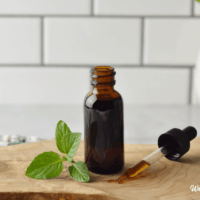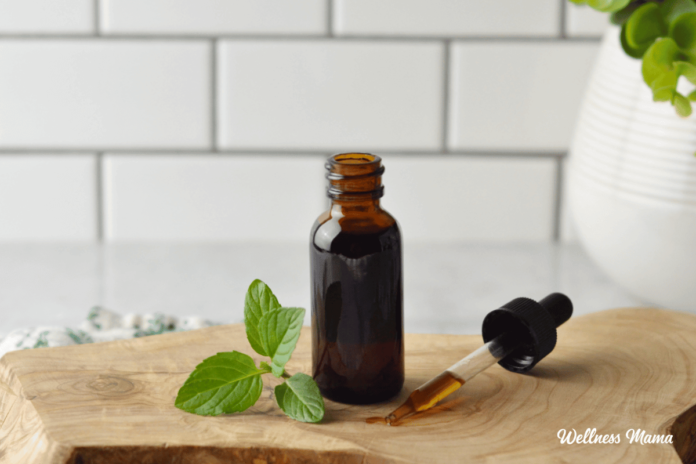This digestion tincture is by far the most used tincture in my home remedy cabinet. It’s simple to make, but effective against lots of digestive issues. If you’re dealing with bloating, IBS, or just need digestive support, then read on.
Digestive Bitters For Gut Health
In modern diets, sugar or salty tastes are often the stars of the show. We don’t naturally rely on a lot of bitter tastes to flavor our food anymore. If you’ve ever had dandelion leaves or frisee lettuce though, then you’ll know what they taste like. Other common digestive bitters include rosemary, orange peel, and coffee. Bitters aid digestive health in several different ways.
These herbs increase our digestive secretions throughout the digestive tract. It all starts with the tongue. As soon as we taste bitter herbs it gets our saliva going and aids digestion the rest of the way down. They also trigger bile flow from the gallbladder to help the healthy digestion of fats.
Aromatic Herbal Blends
Another class of digestion supporting herbal teas and remedies is aromatics. These are more pungent smelling and have strong volatile oils, like mint, fennel, and black pepper. Like bitters they help with digestion, but in a different way. Their volatile oils signal our smooth muscles to relax and tell our nervous system it’s time to settle down and digest.
Herbal Tincture Ingredients
For this digestive tincture blend I use a mix of peppermint, ginger, and fennel.
Peppermint
Peppermint is delicious in mint chocolate chip ice cream, but it’s also great for soothing the digestive system. People with acid reflux may need to exercise caution though. Mint in medicinal amounts can soften the sphincter in the esophagus and trigger heartburn in those already prone to it. If you find that you get heartburn or reflux from using this tincture, then try it without the mint.
Mint helps with an upset stomach and nausea. This makes it great for pregnancy nausea and motion sickness too! Mint also has anti-viral activity and can help with the flu. It both relaxes and stimulates the nervous system to do its job.
Ginger
Ginger is the next herb in the digestion tincture. It stimulates circulation and is great for cold and flu support. Ginger also helps with nausea, motion sickness, and morning sickness. Fresh ginger is easier on sensitive stomachs than dried ginger. There’s some evidence it has anti-inflammatory properties, especially when it comes to arthritis. However, the jury is still out on that one.
Researchers found that ginger performed better than the placebo when it comes to nausea. It helped with nausea and vomiting after surgery, seasickness, and morning sickness. It can also reduce nausea caused by chemotherapy treatment.
Fennel
Fennel, also known as Foeniculum vulgare is another amazing digestive herb. It’s gentle and soothing for all ages, including little ones. You’ll often find it in gripe water preparations. Fennel helps with spasms, and calms colic, and constipation. It’s also a carminative and helps release trapped gas in the intestines. It should be used with caution during early pregnancy though.
How to Use the Digestion Tincture
I’ve used this digestion tincture in transition during labor when nausea hits. It’s also helpful to curb morning sickness and for stomach bugs to help stop vomiting. I also use it for indigestion, heartburn, and other digestive disturbances. If you find that it worsens your heartburn though, then omit the mint and replace it with more of the other herbs. If you’re having a digestive issue of any kind, this will likely work for it.
Getting to the root cause of the problem is always the best idea though. For example, if you have gut dysfunction and a leaky gut, diet changes can help to heal the gut lining. If your baby is always colicky there could be an oral tie or nervous system disruption causing the tummy troubles. In that case, getting evaluated for tongue or lip ties or a chiropractor adjustment can be helpful.
Pregnancy and Nursing
Fennel tea is generally considered gentle and safe for pregnancy, but the tincture is not. It can have estrogenic effects when used in large amounts. Using fennel while breastfeeding can increase milk production and soothe digestive issues for nursing babies.
Mint is commonly used to help with pregnancy nausea. In later stages of pregnancy, it could potentially worsen existing heartburn. Peppermint in larger amounts may reduce breastmilk flow in nursing mothers.
If you’re pregnant then replace the fennel with chamomile. It’s pregnancy safe and has many of the same digestive actions. Be sure to check with your doctor or midwife first before taking any herbal supplements.
Nursing moms may want to omit the peppermint in this digestion tincture. You can replace it with more ginger and fennel instead.
Babies and Children
I always keep this remedy (and homemade chamomile tincture) on hand, especially with kids. This digestive remedy can be used externally on baby’s tummies for colic and gas. You can also rub some on the head (adult or child) for headaches. And of course, it’s what I pull out for my kids when we’re away from home and they’ve indulged in too much unhealthy food.
How Much Do I Take?
Adults can take up to 1 teaspoon in water or tea. For heartburn, indigestion, or nausea, one dose is usually sufficient. You might find you need a second round though. During pregnancy, I used 1/2 teaspoon in the morning for morning sickness. Then I took a few more doses throughout the day as needed.
Children don’t need as much, about 10-20 drops. For babies, you can rub a few drops on their tummies.
If you’re pregnant, nursing, or have a medical condition, check with your doctor or midwife before using any herbal remedy or supplement.
Digestion Tincture Alcohol Strength
Most homemade tinctures are made with 80-proof alcohol (40%). The herbs used in this extract best with a 50-60% alcohol strength though. That’s a little higher than what you can get with your typical vodka. A simple fix is to use 95-proof alcohol and dilute it with distilled water to get to 60%.
That translates to about 2 parts alcohol to 1 part water. This tincture calls for 3 cups total liquid, but if you need more to cover your herbs, use the 2 to 1 ratio. If you’re using fresh mint and ginger, then use 95-proof alcohol with no water added.

4.50 from 2 votes
Digestion Tincture
This easy digestion remedy helps a wide range of issues from nausea, to constipation, and colic.
Prep Time3minutes mins
Maceration Time14days d
Total Time14days d 3minutes mins
Yield: 20 ounces
Author: Katie Wells
Equipment
Materials
- ½ cup dried peppermint leaf
- ¼ cup dried ginger root pieces (or 1/2 cup fresh, finely chopped)
- ¼ cup dried fennel (or chamomile)
- 2 cups 95-proof alcohol (like Everclear)
- 1 cup distilled water
Instructions
- Crush the fennel. Put peppermint, ginger, and fennel (or chamomile) in the glass jar.
- Fill the rest of the jar with alcohol and water. If you don’t have enough liquid to cover your herbs fully, add a little more alcohol and water in a 2:1 ratio until you do.
- Cap the jar and keep in a cool dark place for at least two weeks, but up to six. Shake occasionally.
- After 2-6 weeks, strain the herbs out with a fine mesh strainer or cheesecloth. Compost the herbs.
- Store your tincture in glass dropper bottles in a cool, dark place.
Notes
Start small with the dose and increase as needed.

